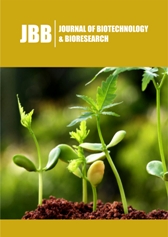- Submissions
Abstract
Journal of Biotechnology & Bioresearch
The Mass-Produced Compound Extract from Antlered form of Ganoderma Lucidum and Red Quinoa Effectively Protects the Liver by Antioxidant and Anti-Inflammatory Mechanisms in Carbon Tetrachloride-Induced Liver Fibrosis Animal Model
-
Open or CloseChin-Feng Liu1, Chong-Ming Pan2 and Chun-Lin Lee2*
1Continuing Education Program of Food Biotechnology Applications, National Taitung University, Taitung, Taiwan
2Department of Life Science, National Taitung University, Taitung, Taiwan
*Corresponding author:Chun-Lin Lee, Department of Life Science, National Taitung University, 369, Section 2, University Rd., Taitung 95092, Taiwan
Submission: May 05, 2024;Published: May 21, 2024

Abstract
Long-term liver inflammation can lead to severe liver conditions, including cancer. The antlered form of Ganoderma lucidum (G. lucidum AF) and Taiwan red quinoa have been shown to contain potent ingredients, like ganoderic acid, Ganoderma polysaccharides, and rutin, known for their antioxidant, anti-inflammatory and hepatoprotective properties. This study aimed to harness the antioxidant, antiinflammatory, and hepatoprotective properties of the antlered form of G. lucidum AF and red quinoa, also known as red quinoa, to create a compound extract granulated powder (GQE). The extraction process was scaled up using a 300-L extractor, yielding a granulated powder containing ganoderic acid A, rutin and Ganoderma polysaccharide. Efficacy was assessed in a mouse model with carbon tetrachlorideinduced liver fibrosis. Results revealed reduced levels of liver function indicators (aspartate transaminase and alanine transaminase) in the GQE-administered group. GQE also mitigated liver cell damage and collagen buildup. Additionally, GQE significantly reduced the expression of tumor necrosis factor-α and interleukin-6, thereby alleviating liver inflammation. For liver fibrosis, GQE effectively decreased the expression of connective tissue growth factor, transforming growth factor β1, and α-smooth muscle actin, thereby inhibiting excessive extracellular matrix accumulation. Hence, the compound product of G. lucidum AF and red quinoa holds potential as a functional extraction powder to ameliorate liver fibrosis.
Keywords:Liver fibrosis; Antlered form of Ganoderma lucidum; Red quinoa; Extraction trial production; Extract granulated powder
 a Creative Commons Attribution 4.0 International License. Based on a work at www.crimsonpublishers.com.
Best viewed in
a Creative Commons Attribution 4.0 International License. Based on a work at www.crimsonpublishers.com.
Best viewed in 







.jpg)






























 Editorial Board Registrations
Editorial Board Registrations Submit your Article
Submit your Article Refer a Friend
Refer a Friend Advertise With Us
Advertise With Us
.jpg)






.jpg)














.bmp)
.jpg)
.png)
.jpg)










.jpg)






.png)

.png)



.png)






